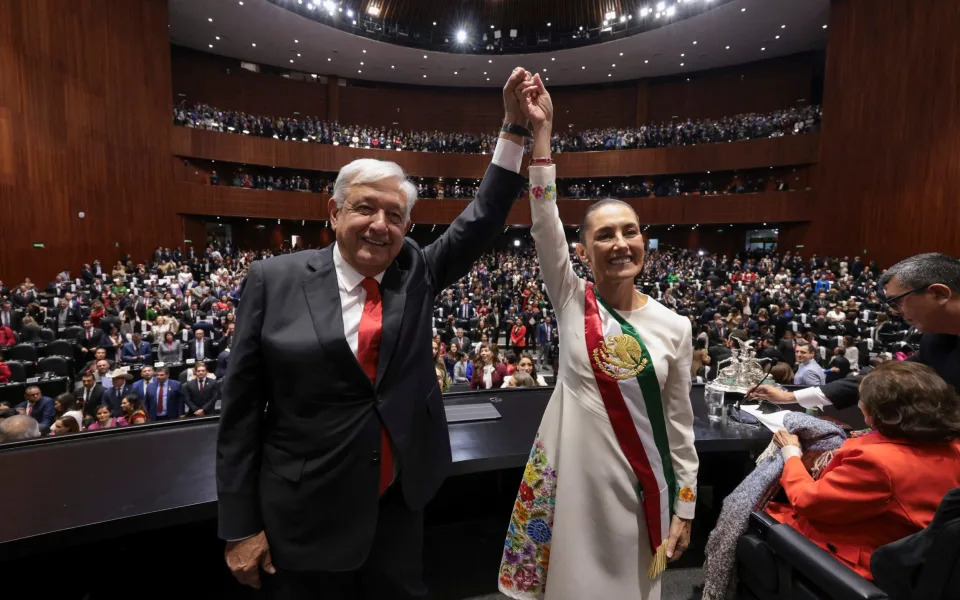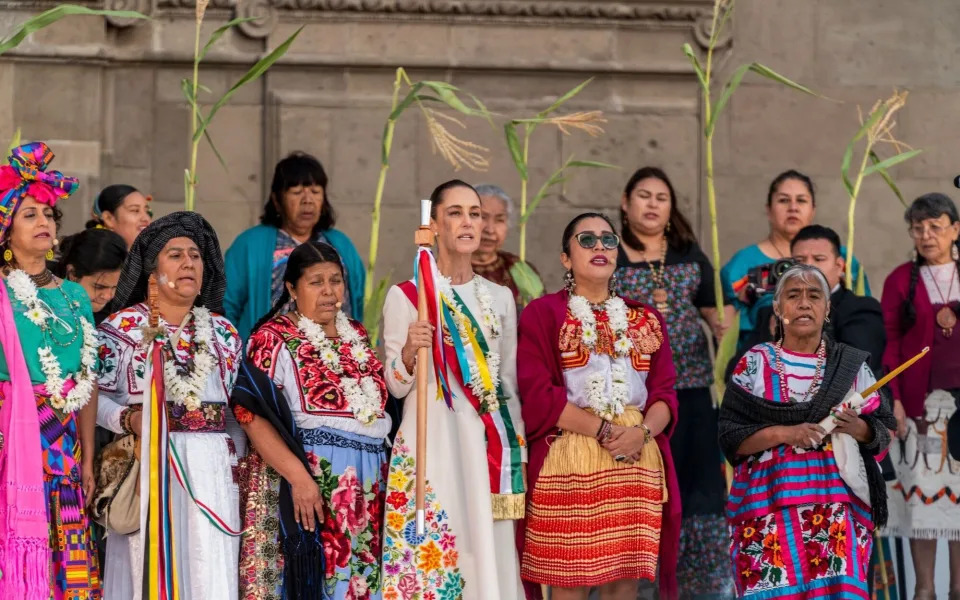Sheinbaum, a 'child of 1968,' apologizes for historic 'atrocity' in Tlatelolco, Mexico City
Patrick J. McDonnell
Wed, October 2, 2024

Demonstrators march in Mexico City in October 2019 in remembrance of the 1968 Tlatelolco student massacre, an event considered part of Mexico's "dirty war" — when the government used its forces to suppress political opposition.
(Fernando Llano / Associated Press)
Calling herself a "child of 1968," Mexico's newly inaugurated President Claudia Sheinbaum issued a formal apology Wednesday for one of the country's most notorious episodes — the brutal repression and murder of student protesters 56 years ago in the capital's Tlatelolco district.
"We cannot forget Oct. 2," said Sheinbaum, who assumed office on Tuesday as the nation's first female president.
The “Tlatelolco massacre,” during which Mexican security forces opened fire on demonstrators, unfolded amid the global upheaval of the 1960s, notable for antiestablishment, antiwar and civil rights protests. Mexico's then-authoritarian leaders were keen to present an image of order and stability before the 1968 Summer Olympics, the first held in Latin America.

Soldiers stand guard on Oct. 12, 1968, for the opening ceremony of the Summer Olympics in Mexico City, days after soldiers opened fire on a peaceful demonstration that has come to be known as the "Tlatelolco massacre." (Associated Press)
Sheinbaum, a leftist activist, condemned the government's 1968 actions in remarks at her inaugural mañanera, or morning news conference, continuing the tradition of media sessions launched by her predecessor and mentor, Andrés Manuel López Obrador.
Read more: Shattering glass ceiling, Claudia Sheinbaum takes office as Mexico's first female president
Her initial mañanera, which featured a video recalling the events of 1968, lasted about an hour and a half — a contrast to the meandering, often-three-hour talkathons presided over by López Obrador, who stepped down Tuesday; under Mexico's Constitution, presidents can serve only one six-year term.
In her remarks on the anniversary of the 1968 massacre, Sheinbaum — who is also commander in chief of the armed forces — accused then-President Gustavo Díaz Ordaz of being responsible for the actions of soldiers and police who committed “one of the greatest atrocities that Mexico lived through in the second half of the 20th century.”
Calling herself a "child of 1968," Mexico's newly inaugurated President Claudia Sheinbaum issued a formal apology Wednesday for one of the country's most notorious episodes — the brutal repression and murder of student protesters 56 years ago in the capital's Tlatelolco district.
"We cannot forget Oct. 2," said Sheinbaum, who assumed office on Tuesday as the nation's first female president.
The “Tlatelolco massacre,” during which Mexican security forces opened fire on demonstrators, unfolded amid the global upheaval of the 1960s, notable for antiestablishment, antiwar and civil rights protests. Mexico's then-authoritarian leaders were keen to present an image of order and stability before the 1968 Summer Olympics, the first held in Latin America.

Soldiers stand guard on Oct. 12, 1968, for the opening ceremony of the Summer Olympics in Mexico City, days after soldiers opened fire on a peaceful demonstration that has come to be known as the "Tlatelolco massacre." (Associated Press)
Sheinbaum, a leftist activist, condemned the government's 1968 actions in remarks at her inaugural mañanera, or morning news conference, continuing the tradition of media sessions launched by her predecessor and mentor, Andrés Manuel López Obrador.
Read more: Shattering glass ceiling, Claudia Sheinbaum takes office as Mexico's first female president
Her initial mañanera, which featured a video recalling the events of 1968, lasted about an hour and a half — a contrast to the meandering, often-three-hour talkathons presided over by López Obrador, who stepped down Tuesday; under Mexico's Constitution, presidents can serve only one six-year term.
In her remarks on the anniversary of the 1968 massacre, Sheinbaum — who is also commander in chief of the armed forces — accused then-President Gustavo Díaz Ordaz of being responsible for the actions of soldiers and police who committed “one of the greatest atrocities that Mexico lived through in the second half of the 20th century.”

Mexican President Claudia Sheinbaum gives a media briefing from the National Palace in Mexico City on Oct. 2. (Fernando Llano / Associated Press)
On the evening of Oct. 2, 1968, forces opened fire on thousands of demonstrators, mostly students, gathered in Tlatelolco’s central square, the Plaza of Three Cultures, named after the country’s Indigenous, European and mestizo formation.
The onslaught culminated weeks of student-led, pro-democracy protests, mirroring anti-Vietnam War protests that were jolting the United States and Europe. “One could hear the steady gunfire and the rattle of machine guns,” Elena Poniatowska, the acclaimed Mexican author, wrote in her 1971 chronicle, “The Night of Tlatelolco.” The plaza, she wrote, “was converted into a living hell.”
Early reports put the death toll at a few dozen, including students, soldiers and police. But human rights activists later said it was likely that more than 300 people, most of them students, were killed.
Read more: 1968 Massacre in Mexico Still Echoes Across Nation : Activism: Killing of students just before Olympics radically changed country. And questions continue.
Tlatelolco was for years a mostly taboo topic here. But, starting in the 1980s, the repression of 1968 was discussed more openly as demands for democratic change shook the dominance of the Institutional Revolutionary Party, or PRI, which ruled Mexico for most of the 20th century. Its candidates had inevitably posted crushing electoral triumphs — Díaz Ordaz was elected in 1964 with almost 90% of the popular vote.
Many here credit continuing outrage about Tlatelolco for helping to spur reforms in Mexico and the weakening of the PRI — and, ultimately, the rise of opposition governments in the 21st century as Mexico moved toward a more democratic path.
"The student movement of 1968 opened the doors for political participation for the young and all of society for a more democratic country," Sheinbaum said.

Mexican soldiers guard a group of young men rounded up after the October 1968 night that came to be known as the "Tlatelolco massacre." (Associated Press)
Sheinbaum is the standard-bearer of the National Regeneration Movement, known as Morena. The party, founded by López Obrador, who left the PRI decades ago during a reform upheaval, currently dominates Mexican politics. Ironically, many opponents now dub Morena the “new PRI," saying it has tried to cover up rising violence and "disappearances" and handed over unprecedented power to the military — a critique rejected by Sheinbaum.
Read more: Is the Mexican government hiding how many people have gone missing?
In issuing a government apology, Sheinbaum, who was a grade-schooler in Mexico City when the Tlatelolco massacre took place, acknowledged an "obligation" and personal motivation: Her mother, Annie Pardo Cemo, 84, participated in the 1968 protest movement as a professor at Mexico’s National Polytechnic Institute. The institute expelled Pardo for her involvement, Sheinbaum said.
Pardo, a biologist whose family fled Bulgaria during World War II, later became a professor at the Autonomous National University of Mexico — where her daughter, the future president, studied, taught and earned a doctorate in climate science.
Special correspondent Cecilia Sánchez Vidal contributed to this report.
This story originally appeared in Los Angeles Times.
Mexico’s first female president promises ‘no return to drug war’
DECRIMINALIZE DRUGS
Daniel HardakerWed, October 2, 2024

Claudia Sheinbaum gives a speech during her swearing in ceremony - Carl de Souza/AFP via Getty Images
Mexico’s first female president promised that there will be no return to the “irresponsible” drug war between the government and the cartels.
Claudia Sheinbaum, 62, pledged more intelligence work and investigations to tackle surging drug-related violence during her swearing-in ceremony on Tuesday.
“There will be no return to the irresponsible drug war,” she said.
Tackling organised crime remains a key political issue in Mexico following the “hugs, not bullets” strategy of her predecessor Andrés Manuel López Obrador, the Left-wing populist.
After taking office in 2018, Mr Obrador declared Mexico’s war on drug cartels “over” and began a policy of addressing the “root causes” of violence.

Claudia Sheinbaum and Andrés Manuel López Obrador, the outgoing president - Mamahua3/AFP via Getty Images
Northern Mexico was thrown into chaos after weeks of deadly gun battles between two factions of the Sinaloa cartel, the country’s biggest and most powerful narcotics gang.
At least 50 people have been killed in the clashes, which began on Sept 9 in the city of Culiacan and have since spread to other parts of Sinaloa.
Mexico’s drug war is considered to have begun in 2006, when Felipe Calderón, then president, sent troops to the state of Michoacán to tackle drug violence.
In her inauguration speech in Mexico’s congress, Ms Sheinbaumo said: “It’s time for transformation, it’s time for women.
“I’m a mother, a grandmother, a scientist and a woman of faith, and from today, by the will of the Mexican people, the president.”

Claudia Sheinbaum (centre) during an inauguration event on Tuesday - Stephania Corpi/Bloomberg
She went on to promise limits on food and fuel prices, as well as an expansion of cash hand-out programmes for women and children.
Ms Sheinbaum was blessed and brushed with herbs and incense by Ernestina Ortiz, a “spiritual guide”, who told her: “You are a voice for all of us who had no voice for a long time.”
An Indigenous elder then handed Ms Sheinbaum a wooden Indigenous “staff of authority”.
After her speech, legislators shouted “Presidenta! Presidenta!”, using the feminine form of president in Spanish for the first time in more than 200 years of Mexico’s history as an independent country.
A scientist by training and the former mayor of Mexico City, Ms Sheinbaum won a landslide victory in June.
No comments:
Post a Comment